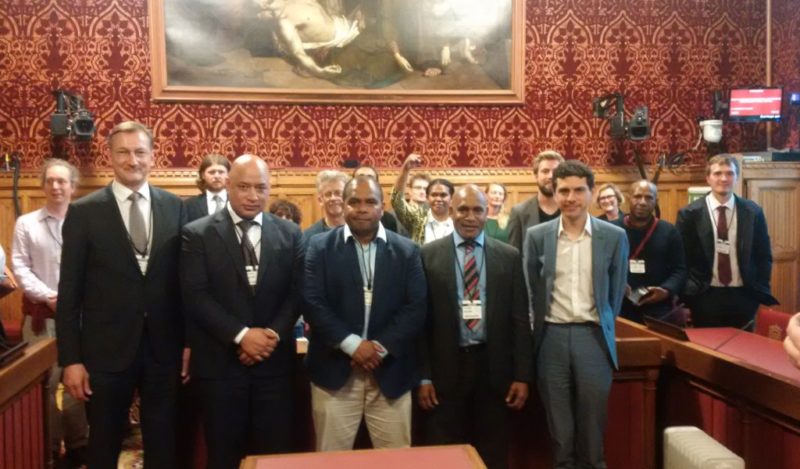UK Parliamentary meeting hears update on the struggle for self-determination in West Papua
June 6, 2019

A meeting held in the UK’s Parliament last Tuesday received extensive updates on the human rights situation in West Papua and the Papuan people’s struggle for self-determination. Diplomats, advocates, MPs and lawyers addressed a well-attended meeting on June 4, 2019.
The All-Party Parliamentary Group on West Papua heard of continued militarisation in the Nduga Regency, a summary of the recent World Council of Churches (WCC) delegation visit to West Papua, an update on Vanuatu’s international lobbying work, and about the implications of the recent Chagos Islands case at the International Court of Justice (ICJ) for West Papua.
Chaired by Alex Sobel MP, the meeting was introduced by Benny Wenda, Chairman of the United Liberation Movement for West Papua, who relayed on-the-ground information he had received that morning from churches inside West Papua regarding the ongoing militarisation and crisis in the Nduga Regency.
Speaking on behalf of the Republic of Vanuatu, Dreli Sololom, First Secretary at Vanuatu’s embassy in Brussels, stated that Vanuatu ‘has an unwavering dedication to make this struggle our struggle’, and condemned the ‘horrendous and gross human rights violations in West Papua’.
Jennifer Robinson, co-founder of the International Lawyers for West Papua, outlined her recent work on the ICJ case regarding the UK and US occupation of the Chagos Islands. Ms Robinson outlined the positive implications the Chagos case had for upholding West Papua’s right to self-determination.
Peter Prove, International Director of the World Council of Churches (WCC), a congregation covering around 600 million Christians world-wide, explained the finding of the recent WCC delegation to West Papua. Papuans, he explained, ‘continue to be marginalized and excluded from […] development, and from education and employment opportunities’, and suffer from ‘high levels of violence and of related human rights violations’. Indonesia’s 2001 Special Autonomy Law, Mr Prove explained, has ‘failed’ to fulfill Papuans’ ‘aspirations with regard to the realization of their human right to self-determination’.
The meeting was attended by representatives from the opposition Labour Party, the Tongan High Commission in London, and many others, and follows shortly after the first-ever House of Commons debate held in the UK in May this year.
This article was first published on the United Liberation Movement for West Papua’s website here.